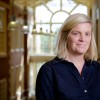This article is more than 5 years old.
To echo Stephanie and Tanya, SAA was in Portland, Oregon last week, and I too made the trek west. I did not make it to SAA last year, so it has been a while since I attended SAA. To add to the excitement, I brought along my husband and my one year old! We spent a few days exploring the West Coast before we headed to Portland for me to get down to business.
I began my conference by attending the Teaching with Primary Sources Unconference (TPS)– an event coordinated by the Reference, Access, and Outreach section of SAA. I focused my time at the TPS Unconference brainstorming how to improve my teaching in Special Collections & Archives. I specifically attended “maximizing impact with only 1-2 sessions” and “active learning techniques” to get inspiration for changes and tweaks to my LIB100 introduction to Special Collections & Archives classes that I teach quite regularly. I am already working to incorporate some of the ideas I got from TPS into my scheduled classes for the Fall!
Along with Stephanie and Tanya, I attended the SAA Leadership Orientation and Forum. I’m no SAA President (like Tanya), but I am picking up a few more leadership roles in SAA, including being elected the Vice Chair/Chair elect for the Reference, Access, and Outreach section as well as the Steering Committee of the Manuscripts Repositories section. My responsibilities for those sections including attending both section meetings where I found the programming to be exciting and thought provoking. Specifically, I was energized and inspired by the Manuscript Repositories section’s panel on handwriting, manuscripts, and cursive writing. At the Indiana State Library, they have installed a cursive handwriting station specifically to encourage K-12 visitors to engage and interact with cursive writing. At UNC Chapel Hill, they hosted a “Transcribe-a-thon” drop in session for undergraduate students to read along with, handle, and create their own manuscripts. Inspired by both of these ideas, I am eager to plan our own sort of manuscript/handwriting/cursive writing event. I am hoping to include cursive writing with quills, manuscript transcription, and even manuscript citation…details to follow!
Another highlight of my SAA conference experience was attending “Alma Mater Uncovered: Students Research Issues of Diversity in the Archives.” This topic has been a constant and worrisome issue that I have come up against in my daily work for years. The panel addressed the broad topic of the records, memories, and collections that are not present in the archives. The voices that are underrepresented, the groups that are marginalized, and the “difficult topics” have not traditionally made their way to the archives, making research on these topics even more difficult. Panelists described their programming, grant processes, and research efforts to uncover and supplement these issues of campus diversity and inclusion in the archives. Johns Hopkins University archivists described a walking tour of the campus that highlights memorials and public displays of memory. This exercise demonstrated how the university values and displays university history. Students were disappointed in the unbalanced display of traditional university scenes (think hallways full of oil paintings of “old white men”) in contrast to less impressive “diversity” efforts (think temporary or less impressive displays in out-of-the-way corners). I couldn’t help but think this exercise might be eye opening on our own campus. Duke University archivists are hosting a summer research program where students produce a project focusing on underrepresented groups, events, or movements as the product of their “Duke History Revisited” program. I left this session both concerned and hopeful. We have been working with researchers on these types of topics for the past few years, but it would be great to develop a more established program to do research on these types of topics.
I attended other sessions, including “Social Media as Archives Function” and “Plan B: How Archivists Navigate Caregiving Responsibilities and Work/Life Balance.” I am happy to discuss these and any of the other sessions I attended more in depth. I don’t think I can incorporate all of the great ideas into my work this semester, but I do hope to make some changes to make my interactions with researchers, classes, and the public more effective and inclusive. I found this conference to be quite rewarding, and appreciate the opportunity to attend.
